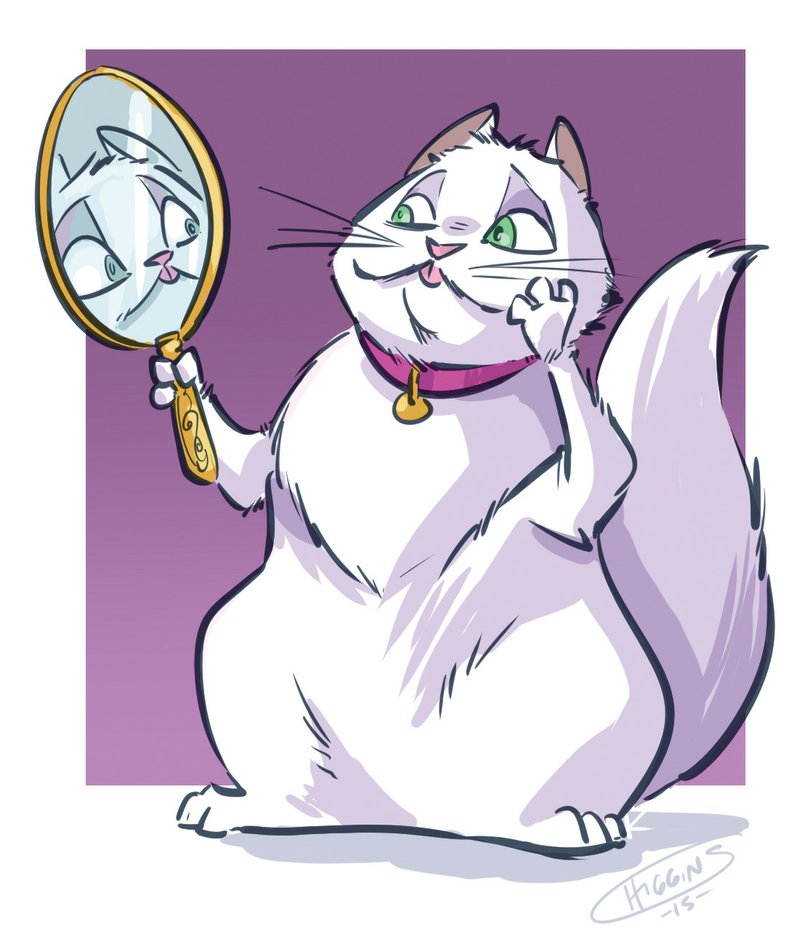My cat sits on my shoulder while I'm reading. There's a mirror across from my favorite chair and I see Siggy looking at it but I don't know if she sees her reflection. Do cats see themselves when they look in a mirror? Do they see us?
Cats and other animals do see images in a mirror, but whether they recognize those images is the question scientists and animal behaviorists are still considering.
Animal lovers also like to ponder the question. For evidence, go online and you'll find numerous humorous videos of cats and dogs appearing to react to seeing themselves in mirrors by swatting the mirror, leaping and running away as if startled, or seeming to examine themselves. Often the people posting the videos offer them as proof that the animal either does or does not recognize itself. But current scientific thought is that when animals see their reflections, it's not clear what they see or whether they connect the image to themselves, according to an article at Vetstreet.com. The only known exceptions are some great apes. Dolphins, elephants and magpies are also thought to recognize their reflections.
Animals of most species, however, don't have the self-awareness that humans possess. For instance, when a cat named Felix looks into a mirror, he doesn't think something like, "There I am, Felix the cat." He might, however, think he sees another animal and might even understand it's a cat. When he swats at the reflection, he could be trying to touch the other animal.
Scientists and researchers have been grappling with the mirror issue (in regards to human and animal perception) since the 19th century. A major step toward an answer came in 1969, when Gordon Gallup Jr., a researcher at Tulane University in Louisiana, developed a test to determine whether chimpanzees could recognize themselves in a mirror. After watching a couple of chimpanzees appear to inspect inside their mouths by looking into a mirror, Gallup decided to go one step further. He painted a chimpanzee's eyebrow and ear tip with red dye, then observed the animal as it gazed into a mirror. According to an article in the May 2014 issue of Nautilus, Gallup theorized that the chimp would touch the painted areas if the chimp recognized the image as itself. The chimp did just that. But when Gallup tried the test with monkeys, the monkeys failed.
Gallup told Nautilus that passing the mirror test indicates an ability he calls "theory of mind." In other words, the animal must possess a level of self-awareness that allows it to contemplate its thoughts and experiences.
Apply Gallup's theory of mind as you observe your cat's reaction to seeing a reflected image and you may have your answer.
...
Sometimes my cat sneezes, but it's not all the time. But could sneezing mean she has a cold?
When a cat sneezes occasionally, it's usually because something has tickled or irritated its nose, according to the Cat Owners Veterinary Handbook. "Sneezing is one of the chief signs of nasal irritation in cats. It is a reflex that results from stimulation of the lining of the nose." Usually, it's not cause for worry, especially if the cat shows no other signs of being sick, the book says.
But there are always exceptions. A sneezing attack that lasts all day long, for example, might be the first signal that a cat has a respiratory infection. If a cat shakes his head violently while sneezing, he could have an object stuck in his nose. In either case, a visit to the veterinarian would be a good idea.
Cats don't get the cold viruses that affect humans, the book says, but they can be infected with other viruses that have similar symptoms. If your cat sneezes and also has a runny nose and oozing eyes, get him to the vet's office as soon as possible.
Family on 04/01/2015
